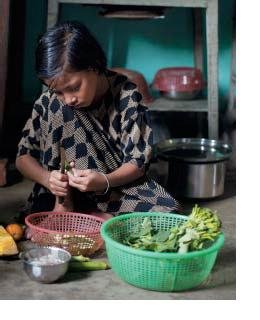
Above a eight year-old child domestic worker works inthe home of a Kolkata family in India and has beenemployed since the age of five. She attends the RightTrack drop-in centre run by Save the Children and isnow attending school.
On the 200th anniversary of the Slave Trade Act, a new report by Save the Children UK reveals millions of children are still living as child slaves.
Download the Report here: Small Hands of Slavery [PDF, 200MB]
The report exposes the eight most prevalent forms of child slavery that are still condemning children to live in appalling conditions, forced to work long hours for little or nothing in return and often subject to extreme harm, violence and rape.
Child trafficking
- 1.2 million children and babies are trafficked every year, including into Western Europe, the Americas and the Caribbean, and the number is increasing
- Gangs involved in child and people trafficking make an estimated profit of US$32 billion per year
Child prostitution
- At any one time across the world, around 1.8 million children are being abused through prostitution, child pornography and sex tourism
- In the UK there are 5,000 child prostitutes. 75% of them are girls
Bonded child labour
- Millions of children are forced to work away their childhood in horrific conditions to pay off debt, or simply the interest on it
- In India alone, estimates suggest up to 15 million children could be enslaved by somebody else's debt, many involved in illegal, hazardous and dangerous work
Forced work in mines
- One million children are risking their lives in mines and quarries in more than 50 African, Asian and South American countries
- In the Sahel region of Africa, 200,000 children are daily risking their lives in gold and mineral mines
Agricultural labour
- 132 million children under 15 are trapped working in agriculture, often exposed to pesticides, heavy machinery, machetes and axes
- In Kazakhstan, children work in cotton and tobacco fields and factories for up to 12 hours a day, seven days a week
Child soldiers
- 300,000 children under 15 are involved with fighting forces, including government armies. Boys and girls in at least 13 countries are actively being recruited as child soldiers or as army 'wives'
- Around 11,000 children in Democratic Republic of Congo are currently being held by fighting groups
Forced child marriage
- Child marriage, which often includes mail order and internet brides, is one of the most widespread - yet hidden - forms of slavery. Girls as young as four are forced to live and have sex with their husband, and are often kept trapped indoors
- Girls under 15 are five times more likely to die during pregnancy and childbirth than women over 20. In Afghanistan more than half of all girls are married before they are 16
Domestic slavery
- Millions of children across the world, some as young as six, are forced to work up to 15 hour days as domestic workers. Many are beaten, starved and sexually abused
- There are 200,000 child domestic workers in Kenya, 550,000 in Brazil and 264,000 in Pakistan.
Jasmine Whitbread, CEO Save the Children UK:
"Child slavery is not a historical phenomenon - it is a stark reality for millions of children in both poor and rich countries. These children are treated like commodities; they can be lent or sold to other owners without warning, and live under crushing conditions of humiliation and abuse. Governments everywhere - including the UK - are not doing enough to respond to the plight of children in this inhumane situation. World leaders and international donors must act as a matter of urgency to address child slavery and put in place the laws and resources needed to eradicate these terrible practices."
Save the Children UK is calling on all governments to:
- address and ensure the eradication of child slavery through their own policies on global poverty reduction
- invest sufficient money and resources to protect child associated with slavery
- implement international standards on the worst forms of child labour where children in slavery are found
- put in place protection programs, including recovery and rehabilitation, to offer emergency and long-term support to all children trapped in slavery-like conditions
- ensure education is offered in ways that support the removal of children involved in the worst forms of child labour; for example, that it is accessible, flexible and affordable.
Save the Children UK is calling on the public to:
- lobby their MPs to make the elimination of child slavery a priority
- support fair trade initiatives that protect the rights of child labourers.
Source: Save the Children

No comments:
Post a Comment